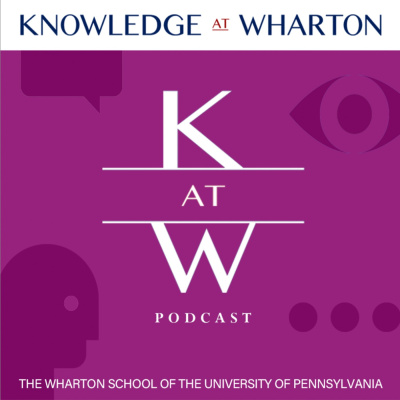Sinopse
Audio interviews with industry leaders and senior faculty with exclusive insights on current topics brought to you by Knowledge@Wharton and the Wharton School of the University of Pennsylvania.
Episódios
-
Everything from Oil to Silver: Are Speculators Causing Too Much Volatility?
25/05/2011 Duração: 11minAllegations that traders manipulated oil prices in 2008 are reinforcing the buzz -- at the gas pump and elsewhere -- that speculators are driving up the price of oil triggering wild price spikes and nail-biting volatility. Fingering speculators is a popular pastime these days but experts at Wharton and elsewhere say the blame is often misplaced. Although speculation can affect prices most of the recent price swings in oil and other commodities are happening for fundamental economic reasons. See acast.com/privacy for privacy and opt-out information.
-
Urban Outfitters’ Glen Senk: Look for the Right Culture Diverse Opinions and ’Bad News’
25/05/2011 Duração: 11minAccording to Glen T. Senk the key to success is hiring and cultivating the right people. At a recent Wharton Leadership Lecture the CEO of Philadelphia-based retailer Urban Outfitters underscored the importance of recruiting and developing a team that is a good fit for corporate culture -- and then listening to what those employees have to say even when ”you have to pull [the bad news] out of them.” See acast.com/privacy for privacy and opt-out information.
-
Why Middle Managers May Be the Most Important People in Your Company
25/05/2011 Duração: 10minWharton management professor Ethan Mollick has a message for knowledge-based companies: Pay closer attention to your middle managers because they may have a greater impact on company performance than almost any other part of the organization. Mollick’s research based on an in-depth analysis of the computer game industry is presented in a new paper titled ”People and Process: Suits and Innovators: Individuals and Firm Performance.” See acast.com/privacy for privacy and opt-out information.
-
What’s Behind Microsoft’s $8.5 Billion Takeover of Skype?
11/05/2011 Duração: 27minRumors that Facebook or Cisco would buy Skype were proven wrong on Tuesday when Microsoft struck an $8.5 billion deal to acquire the online voice and video chat service. Most analysts welcomed the takeover as a shrewd move on the grounds that it positions Microsoft in a commanding position in the emerging markets of video content and online telephony. Still considering that Skype’s previous acquisition by eBay ended in a $1.4 billion write-down questions remain. Will there be a good cultural fit between Microsoft and Skype? Did Microsoft overpay for a company that continues to lose money? Knowledge at Wharton discussed these questions and more with Wharton professors Eric Clemons and Kevin Werbach. See acast.com/privacy for privacy and opt-out information.
-
Many-stop Shopping? How Niche Retailers Are Thriving on Internet 2.0
11/05/2011 Duração: 15minA decade after pets.com and a string of other early Internet specialty retailers collapsed a new wave of start-ups -- enabled by the power of cloud computing advanced delivery systems and deep social relationships with customers -- is shaping e-commerce. From diapers and eyeglasses to pool tables and yes pet products entrepreneurs are developing specialty businesses to compete alongside one-stop shopping giants like Amazon.com and Walmart.com. See acast.com/privacy for privacy and opt-out information.
-
Wharton’s 2011 Business Plan Competition: Babies High Fashion and Fundraising
11/05/2011 Duração: 15minSince the dot.com bubble burst more than a decade ago two popular categories in Wharton’s Business Plan Competition (BPC) have been health care and retail. This year was no exception. With more than $115 000 at stake in combined cash prizes and legal and accounting services the eight finalists of this year’s BPC presented their pitches on April 27 to a panel of judges and an audience of venture capitalists business leaders faculty and students. Read on and see if you can spot the winners. See acast.com/privacy for privacy and opt-out information.
-
What Upheaval in the Middle East Means for Business
06/05/2011 Duração: 21minSee acast.com/privacy for privacy and opt-out information.
-
Lowering the Deficit: The Choices Range from Drastic to Draconian
27/04/2011 Duração: 18minThe United States government spends more than it takes in a practice that is illegal in most state governments and harshly criticized when households and businesses do it. After being the rule rather than the exception for most of the past century why is the country’s deficit spending such a big deal now? Is the U.S. really on the edge of a precipice? Will the deficit-reduction plans under consideration in Washington work? How painful will the remedies be? Wharton faculty and other experts weigh in. See acast.com/privacy for privacy and opt-out information.
-
Estée Lauder’s William Lauder: ’The Consumer Still Wants and Needs to Be Touched’
27/04/2011 Duração: 22minEstée Lauder -- the $7.8 billion cosmetics and beauty products giant founded in 1946 -- has grown to more than 25 brands in 140 countries. The company clearly knows its customers 95% of whom are women. In a recent interview with Knowledge at Wharton William Lauder the company’s executive chairman and the grandson of founder Estée Lauder discussed the challenges of working in a family-owned business the company’s global growth aspirations and why the key to success is ”getting women to put their hands together.” See acast.com/privacy for privacy and opt-out information.
-
The Flap over Cisco’s Flip: Why the Company Killed off a Popular Product
27/04/2011 Duração: 10minThe Flip a quick and easy video recorder that captures spontaneous moments for instant uploading to YouTube is about to fold. Cisco Systems which bought the Flip just two years ago is closing the business in a move that illustrates how rapidly evolving technology and business strategies can force major corporate flip-flops. See acast.com/privacy for privacy and opt-out information.
-
Nassim Taleb on Living with Black Swans
13/04/2011 Duração: 37minNassim Taleb is a literary essayist hedge fund manager derivatives trader and professor of risk engineering at The Polytechnic Institute of New York University. But he is best known these days as the author of The Black Swan: The Impact of the Highly Improbable. During a recent visit to Wharton as part of The Goldstone Forum he spoke with Wharton finance professor Richard Herring -- who taught Taleb when he was a Wharton MBA student -- about events in the Middle East the oil supply investing in options the U.S. economy the dollar health care and of course black swans. See acast.com/privacy for privacy and opt-out information.
-
Former Random House CEO Alberto Vitale: ’Paper Books Will Evolve into More Precious Products’
13/04/2011 Duração: 40minAlberto Vitale was running Bantam Books the world leader in paperbacks when the Newhouse family recruited him to become the COO of Random House. In that role and later as the CEO of one of the world’s top publishing firms Vitale oversaw huge changes in the publishing industry. In this interview with Stephen J. Kobrin publisher and executive director of Wharton Digital Press and Knowledge at Wharton Vitale discusses the rise of digital publishing the future of bookstores and the globalization of copyright among other issues. See acast.com/privacy for privacy and opt-out information.
-
Another Tech Bubble? Separating the Froth from the Facts
13/04/2011 Duração: 14minValuations are growing aggressively for Facebook Groupon and a handful of other social media darlings. But does that growth signal the coming of another tech bubble? Not necessarily say Wharton faculty and other experts who note that the main issues are the extent to which these valuations are supported by real staying power and whether or not these companies are having an undue influence across the tech landscape. See acast.com/privacy for privacy and opt-out information.
-
The Ouster of Muhammad Yunus: Can Politics Destroy Grameen Bank?
13/04/2011 Duração: 18min”Dismissed.” A single word from Bangladesh’s highest court ended a bitter legal battle that has grabbed world attention. The loser in this case: Muhammad Yunus the 70-year-old Nobel Peace Prize laureate and founder of Grameen Bank the groundbreaking Bangladeshi microfinance institution he is no longer allowed to run. But as with many of the highs and lows of microfinance there is much more than meets the eye to this boardroom shakeout. See acast.com/privacy for privacy and opt-out information.
-
One Woman’s Advice to Another: It’s Always Time to Speak Your Mind
30/03/2011 Duração: 11minWhile women have indeed come a long way since earning the right to vote in 1920 they still have not achieved wage and income equity compared with their male counterparts notes a government report released this month. The reason according to a series of speakers and panelists at the recent Wharton Women in Business Alumnae Conference 2011 is that women still need to assert themselves more when establishing work relationships seeking sponsors trying to make their presence -- and contributions -- known or negotiating for a raise. As one speaker noted: ”Women don’t ask.” See acast.com/privacy for privacy and opt-out information.
-
From Virtual Barnyards to Real Dollars: Andrew Trader on Zynga ’Gamification’ and the Power of Analytics
30/03/2011 Duração: 34minBy combining the might of Facebook with the narrative element of experiential computer games like Oregon Trail or The Sims social gaming developer Zynga was able to become one of the fastest-growing companies on the Internet. Andrew Trader was a member of Zynga’s founding team in 2007 and until last year served as executive vice president of sales and business development. Now an entrepreneur-in-residence at Maveron a venture capital firm Trader recently talked to Knowledge at Wharton about Zynga’s success and the rise of social gaming. See acast.com/privacy for privacy and opt-out information.
-
U.S. Energy Policy after Japan: If Not Nuclear Then What?
30/03/2011 Duração: 12minAs the crisis at Japan’s crippled Fukushima Daiichi plant continues to unfold every bit of news that trickles out deepens the debate about nuclear energy. Anti-nuclear activists point to smoldering reactors and radioactive drinking water; others say the fact that the aging plant survived the earthquake and tsunami without greater damage signals its ability to withstand major disruptions. At issue is whether the expansion of nuclear power in the U.S. gets a green red or yellow light. See acast.com/privacy for privacy and opt-out information.
-
In the Health Care Sector Who Should Choose Which Treatment Is Best?
30/03/2011 Duração: 13minEach day workers in the health care field debate the most reliable course of action for treating a particular ailment. As part of U.S. health care reform new emphasis is being placed on comparative effectiveness research (CER) which pits remedies against one another to determine which is best. A new paper by Wharton professor Scott Harrington warns that the government should avoid developing a monopoly on CER and offers suggestions for sparking interest from private sector researchers. See acast.com/privacy for privacy and opt-out information.
-
Keeping Its Distance: Can the Fed Be Effective Innovative -- and Independent?
30/03/2011 Duração: 12minThe U.S. Federal Reserve Bank played a central role in mounting a response to the financial crisis of 2008. Battling unprecedented disasters the Fed responded with what experts describe as creative even heroic measures. But in the wake of that crisis the Fed faces new challenges including an increasingly critical Congress at a time when the central bank’s responsibilities have expanded in significant ways. Observers question whether the Fed can continue to effectively monitor the financial landscape while also keeping clear of the politicians in Washington. See acast.com/privacy for privacy and opt-out information.
-
Crisis in Japan: What Will the Costs Be?
16/03/2011 Duração: 01h03minIt may be years before the costs -- human and economic -- of the devastating earthquake and tsunami on March 11 in Japan are fully known but they will be enormous. With thousands feared dead throughout the northeastern part of the country and officials scrambling to contain a nuclear disaster there are now more questions than answers. Knowledge at Wharton asked four experts to share their thoughts about the impact of the disaster. See acast.com/privacy for privacy and opt-out information.























